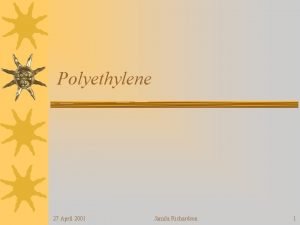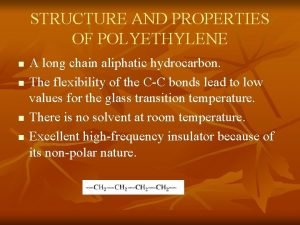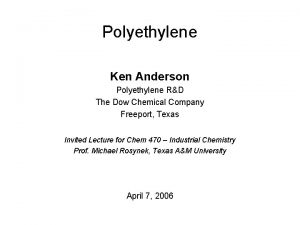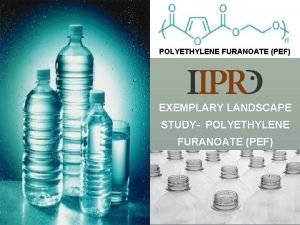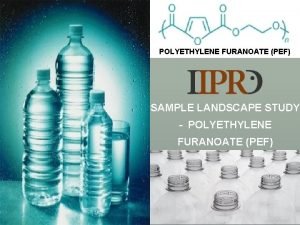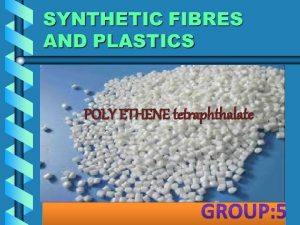Polyethylene 27 April 2001 Jamila Richardson 1 Starting











- Slides: 11

Polyethylene 27 April 2001 Jamila Richardson 1

Starting Up ¬ Polyethylene was first produced by British company Imperial Chemical Industries. Preparation required temperatures up to 200 deg C and pressures up to 2000 atm. ¬ Karl Ziegler prepared a high molecular weight polyethylene at room temperature in 1952 while working at Dacron Industries. ¬ ICI polyethylene had shorter, branched chains, and was waxy and easily deformed. Ziegler’s puppy was had and rigid, and could easily be easily drawn into fibers. ¬ Giulio Natta extended Ziegler’s research, eventually showing how the geometry of polyethylene could be controlled by certain catalysts (produced by Ziegler). 27 April 2001 Jamila Richardson 2

Ethylene, the interesting molecule ¬ Ethylene, because of its double bond, is more reactive than ethane. Double bonded carbons make molecule more susceptible to bonding with other molecules. ¬ When approached by another molecule, the double bond splits; the carbons are joined by a single bond, leaving the molecule free to bond with both carbons. ¬ Ethylene is used in the ripening of fruit; it stimulates the metabolic processes of the fruit by dissolving into the cell membrane, therefore 27 April 2001 Jamila Richardson 3 increasing its permeability

Formation and Structure ¬ Ethylene-Ethylene bond yields polyethylene (CH 2)n polyethylene ¬ Crystalline regions lie in alternating fashion with amorphous regions, which creates scattering of light 27 April 2001 ¬Pure polyethylene, lowand high-density polyethylene (LDPE, HDPE) Jamila Richardson 4

High-Density Polyethylene ¬ Absence of branching results in a more closely packed structure, more crystalline, higher density, and chemical resistance slightly higher than that of LDPE. ¬ Resists alcohols, acids, bases, esters, and aldehydes ¬ Specific Gravity: 0. 94 to 0. 97 ¬ Melting point 130 to 135 deg C ¬ Carbon chains can are 10, 000 to 100, 000 carbon atoms long 27 April 2001 Jamila Richardson 5 ¬ Translucent

Low-density Polyethylene (LDPE) ¬ Small amount of branching on the chain gives a more open structure ¬ Melting point of 109 to 125 deg C ¬ Does not react at room temperature ¬ Resists alcohols, esters, acids, and bases. Limited resistance to aldehydes. ¬ Translucent to opaque ¬ Used for plastic food or garment bags, spray bottles, plastic lids. 27 April 2001 Jamila Richardson 6

Pure Polyethylene ¬ Low density arises from minimal amount of branching in chain, gives a more open structure. ¬ Translucent to opaque ¬ Resists acids, bases, esters, alcohols, hydrocarbons. Limited resistance to aldehydes. ¬ Does not react at room temperature ¬ Translucent to opaque. 27 April 2001 Jamila Richardson 7

Properties ¬ Poylethylene is a solvent for fats, oils, and grease. Dissolving occurs slowly. ¬ Electrons are tightly trapped in their C-C and C-H bonds, which results in an inability of electrical current to flow. ¬ Also results in inability for water and ions to penetrate interior of solid. 27 April 2001 Thin film of polyethylene photographed using polarized light. The pattern arises form the presence of spherulites, or regions where the polymer molecules have aggregated into spheres. Picture and caption from Molecules Jamila Richardson 8

Other (Fun) Facts ¬ Polyethylene is a thermoplastic. That is, it becomes soft and malleable when heated, and hard and solid when cooled. (So, basically, it’s a plastic. Wow. ) ¬ Polyethylene is an addition polymer. The double bonds allow for splitting and bonding with other molecules. 27 April 2001 Jamila Richardson 9

R-E-C-Y-C-L-E, Recycle. . . ¬ Polyethylene does not biodegrate unless first oxidized. ¬ Polyeofins are highly susceptible to photooxidation, or oxidation caused by the exposure to light. Hindered-amine light stabilizers are then used Polyethylene film, which is widely used for to prevent photooxidation. packaging, is formed by extruding the molten plastic through a ring-like gap and inflating it like a balloon. 27 April 2001 Photo and caption from Molecules Jamila Richardson 10

Well, that’s it. ¬I hope you enjoyed my presentation. BYE! 27 April 2001 Jamila Richardson 11
 27 april 2001
27 april 2001 Astronomy picture of the day 17 april 2001
Astronomy picture of the day 17 april 2001 Jamila edwards
Jamila edwards Adjective in arabic
Adjective in arabic Jamila piracci
Jamila piracci Disadvantages of polyethylene glycol
Disadvantages of polyethylene glycol Polyethylene structure and properties
Polyethylene structure and properties Disadvantages of suppositories
Disadvantages of suppositories High density polyethylene
High density polyethylene Polyethylene glycol mechanism of action
Polyethylene glycol mechanism of action Oxidized polyethylene
Oxidized polyethylene Professor peter richardson
Professor peter richardson
